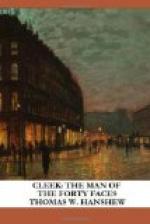Cleek heard Anita’s soft rippling laughter; but he waited to hear no more. Moving swiftly away from the well-hole of the staircase he passed on tiptoe down the hall to the Major’s rooms, and, opening the door, went in. The old soldier was standing, with arms folded, at the window looking silently out into the darkness of the night. He turned at the sound of the door’s opening and moved toward Cleek with a white, agonised face and a pair of shaking, outstretched hands.
“Well?” he said with a sort of gasp.
“My dear Major,” said Cleek quietly. “The wisest of men are sometimes mistaken—that is my excuse for my own short-sightedness. I said in the beginning that his was either a case of swindling or a case of murder, did I not? Well, I now amend my verdict. It is a case of swindling and murder; and your son has had nothing to do with either!”
“Oh, thank God! thank God!” the old man said; then sat down suddenly and dropped his face between his hands and was still for a long time. When he looked up again his eyes were red, but his lips were smiling.
“If you only knew what a relief it is,” he said. “If you only knew how much I have suffered, Mr. Cleek. His friendship with that Spanish woman; his going with her to identify the: body—even assisting in its hurried burial! These things all seemed so frightfully black—so utterly without any explanation other than personal guilt.”
“Yet they are all easily explained, Major. His friendship for the Spanish woman is merely due to a promise to intercede for him with Zuilika. She is his one aim and object, poor little donkey! As for his identification of the body—well, if the widow herself could find points of undisputed resemblance, why not he? A nervous, excitable, impetuous boy like that—and anxious, too, that the lady of his heart should be freed from the one thing, the one man, whose existence made her everlastingly unattainable—why, in the hands of a clever woman like Anita Rosario such a chap could be made to identify anything and to believe it as religiously as he believes. Now, go to bed and rest easy, Major. I’m going to call up Dollops and do a little night prowling. If it turns out as I hope, this little riddle will be solved to-morrow.”
“But how, Mr. Cleek? It seems to me that it is as dark as ever. You put my poor old head in a whirl. You say there is swindling; you hint one moment that the body was not that of Ulchester, and in the next that murder has been done. Do, pray, tell me what it all means—what you make of this amazing case.”
“I’ll do that to-morrow, Major; not to-night. The answer to the riddle—the answer that’s in my mind, I mean—is at once so simple and yet so appallingly awful that I’ll hazard no guess until I’m sure. Look here”—he put his hand into his pocket and pulled out a gold piece—“do you know what that is, Major?”
“It looks like a spade guinea, Mr. Cleek.”




